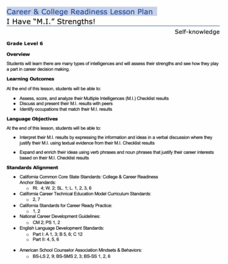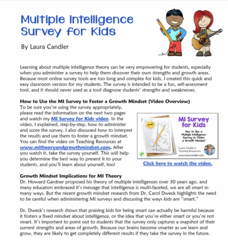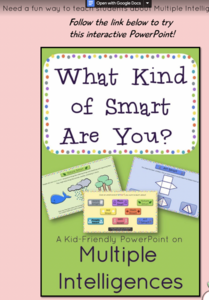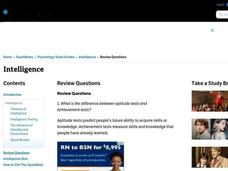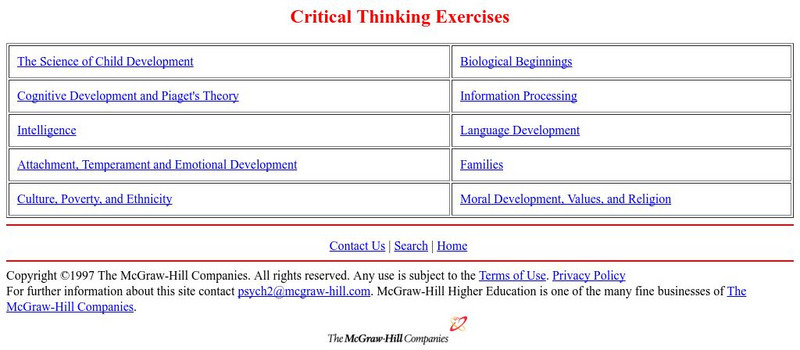California Department of Education
I Have “M.I.” Strengths!
There are so many ways to be smart! Can your class identify their intelligences? The third of five career and college lesson plans designed for sixth graders challenges them to assess their unique skills. Once they determine their...
Overcoming Obstacles
Learning How You Learn Best
Scholars think of a special place, then represent that place through pictures or written words— a poem, song, or short story. Peers show off their organizational skills by reviewing their binders and notebooks, comparing strategies, and...
California Department of Education
I Have “M.I.” Strengths!
Scholars complete an interest survey to discover their learning style. Based on their newfound knowledge, learners examine and discuss a list of careers that work best with their learning style.
Teachers Pay Teachers
Multiple Intelligence Survey for Kids
Scholars rate 24 statements 0-5 then calculate their responses to discover their preferred intelligence and which intelligences require more practice.
Teachers Pay Teachers
What Kind of Smart Are You
Gain insight into the type of learners that fill your classroom. An eight-question survey asks scholars questions about themselves. Using their color-coded answers, they conclude their degree of intelligence in multiple areas—music,...
Health Smart Virginia
Emotional Intelligence Quotient
As an end of the Health Smart unit self-assessment, scholars design a cup with a logo and motto that reveals their emotional intelligence. To prepare, individuals complete a worksheet describing the seven Emotional Intelligence Quotients...
College Board
2003 AP® Psychology Free-Response Questions
Intelligence testing can be a useful tool—but what are its limits? Scholars explore the question, considering issues such as the role of bias, using authentic College Board materials. Learners also examine the psychological factors...
College Board
2012 AP® Psychology Free-Response Questions
Deciding where to go to college is a tough choice, but psychology helps shed some light on how people make up their minds. Learners consider factors such as ethnocentrism and crystallized intelligence using an exam from College Board. A...
abcteach
Flowers for Algernon, by Daniel Keyes
Looking for materials to accompany your study of Flowers for Algernon, by Daniel Keyes? Look no further! Included here is everything you need to go alongside your unit: worksheets, graphic organizers, writing assignments, an assessment,...
Curated OER
Be Brain Smart
Students examine the function of the brain. Using the internet, they research facts of the brains of vertebrates. Using clay, they make three sculptures of brains of different vertebrates and use crayola colors to color it. To end the...
Curated OER
Getting to Know You
Students explore ways in which they are smart. In this "getting to know you" classroom team building lesson, students discuss various ways people can be smart and describe ways in which they are smart. Students listen to "Smart" from...
Curated OER
The Great Apes
Students prepare experiment plans for a peer review session to test the intelligence level of gorillas. They view and discuss a Discovery Channel video on the wild behaviors of gorillas then create three experiments that could test the...
Curated OER
Naturral Born Robots: Robots Have Feelings Too
Students explore robotics. They design a simple device that simulates a human arm lifting a mass. Students test the strength of their arm. Students discuss artificial intelligence.
Curated OER
It's Alive!
Students define the term artificial intelligence and list devises that use it. After reading an article, they discuss how advances in this field affect our lives. In groups, they brainstorm about a device that could improve the life of...
Curated OER
Intelligence
In this psychology worksheet, students complete a 5 short answer quiz on intelligence. They identify evidence on hereditary influences on intelligence.
Curated OER
Intelligence
In this psychology worksheet, students answer 10 multiple choice questions related to intelligence, IQ and heritability of certain traits.
Curated OER
Airborne & Special Operations Museum OSS Crossword Puzzle
In this history worksheet, students answer key questions and/or descriptions to complete the puzzle related to Special Operations. There are 21 words/names needed to complete the puzzle.
Curated OER
What Kind of Smart?
Students participate in a lesson in order to discover the type of intelligence they have for learning. This is done by taking a Multiple Intelligences Survey. The focus of the lesson is a question posed to students. The homework is an...
Curated OER
Get Smart
Students discuss the definition of intelligence and the possibility of measuring intelligence. They consider the elements of intelligence by reading and discussing the article "'Jeopardy' Millionaire is Smart, but Is He a Genius?They...
Curated OER
I Spy
Students examine the responsibilities of the CIA and work as a team of analysts to produce intelligence reports. Letters are written predicting how their assigned countries have changed by 2008.
Curated OER
National Security
Students discuss the Rosenberg spy case during the Cold War. They research and report on a recent or current investigation into espionage by people working for the U.S. government. Students find out what they can from newspapers,...
Curated OER
Lippmann vs. The Testers: Can Intelligence Be Measured?
Students examine the ideas of Walter Lippman and standardized testing. They discover the ideas and beliefs behind using standarized tests. They examine a copy of an IQ test and discuss.
McGraw Hill
Mc Graw Hill Companies: Critical Thinking Exercises
10 valuable critical thinking exercises ranging in subject matter. Includes questions and exercises regarding biological development, language usage, morals, values and ethics, and thought cycles.
York University
Classics History of Psychology: New Methods Intellectual Level of Subnormals
Alfred Binet and Theodore Simon's work from 1905 serves as an introduction to the classic study on intelligence by Henry L. Minton, University of Windsor.




